
1 Year Warranty
1 Year Warranty
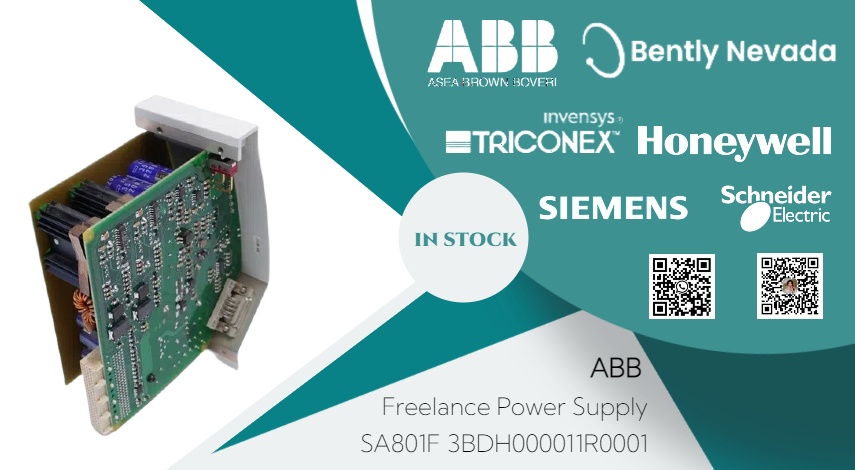
In recent years, the rapid development of industrial automation technology has put forward higher requirements for production efficiency and operational reliability, and as an important component of this field, the performance and stability of control systems are particularly critical. In this context, SA801F 3BDH00011R0001 stands out as an important technological product in the field of intelligent automation. Product Overview and Technical Features SA801F 3BDH00011R0001 is a high-performance module launched by the well-known industrial control brand ABB, designed to improve the operational efficiency and stability of industrial systems. This product adopts advanced hardware architecture and software technology, which can meet the high load operation requirements in complex industrial environments. Core features: Efficient performance: SA801F is equipped with advanced processing chips that can quickly handle large amounts of data and complex computational tasks, with particularly outstanding real-time performance. Reliability and stability: This module has excellent anti-interference ability and is suitable for industrial scenarios with complex electromagnetic environments, ensuring long-term stable operation of the system under high loads. Modular design: The modular structure enables SA801F to support flexible configuration, making it easy for enterprises to expand or upgrade according to their needs. Strong compatibility: As part of ABB's automation system, SA801F is compatible with multiple control protocols and can be easily integrated into existing industrial control networks. Application areas and market feedback SA801F has been widely used in various industrial fields, including petrochemicals, power energy, metallurgical manufacturing, and water treatment. Its outstanding performance greatly improves the operational efficiency of the production line, while significantly reducing the failure rate and maintenance costs. Feedback from users indicates that the product has particularly outstanding performance in terms of intelligence and security. After introducing SA801F, a large petrochemical enterprise has improved the operational efficiency of its production line by about 20% and reduced the failure rate by more than 30%, saving the enterprise considerable operating costs. Future prospects With the arrival of the Industry 4.0 era, intelligence and automation will become the main trends in future industrial development. SA801F 3BDH00011R0001, with its leading technological advantages, will play a more important role in this wave. Whether it is the upgrade and renovation of existing systems or the construction of a new generation of intelligent factories, SA801F will be a trustworthy choice for users. In the future, ABB will continue to launch more innovative products to inject new vitality into the development of industrial automation. Epilogue SA801F 3BDH00011R0001 is not only an excellent industrial automation module, but also a witness...
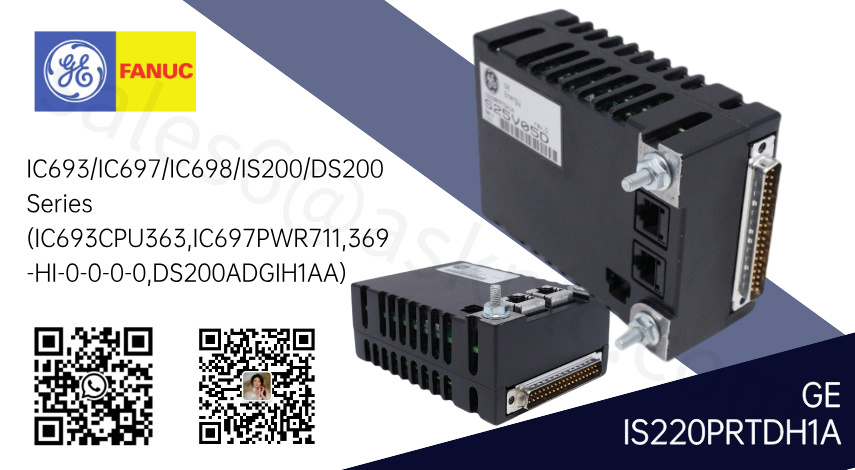
The IS220PRTDH1A module launched by General Electric (GE) has become one of the highly anticipated products in the field of industrial automation due to its excellent performance and reliability. As an important component of the GE Mark VIe control system, this module is designed to provide precise temperature measurement and real-time data acquisition, providing innovative solutions for temperature control applications in multiple industries. Breakthrough design and functionality GE IS220PRTDH1A is an input module with thermal resistance (RTD) technology as its core, which can support up to 10 RTD channels. This module is compatible with multiple RTD types, such as Pt100, Pt1000, etc., and can adapt to a wide range of industrial scenarios. Its temperature measurement range is wide, with high sensitivity and accuracy, ensuring real-time capture of temperature changes. Another significant feature of this module is its support for hybrid configurations of thermocouples and analog inputs, making it more adaptable in complex industrial environments. Equipped with advanced self diagnostic functions, IS220PRTDH1A can monitor its own operating status in real time, helping users quickly locate potential problems and improve the reliability and efficiency of equipment operation. Key technological advantages 1. High precision and reliability IS220PRTDH1A adopts advanced anti-interference design to ensure stable and accurate temperature measurement even in harsh industrial environments. This characteristic is particularly important for industries such as petrochemicals, electricity, and manufacturing that require extremely high temperature control. 2. Flexibility and compatibility The diversity of input support for modules and seamless integration with the GE Mark VIe system make it easy to adapt to different process requirements. In addition, through redundant architecture design, it has excellent fault tolerance in critical systems. 3. Intelligent monitoring and simplified maintenance This module supports real-time data collection and remote diagnosis, significantly reducing downtime and decreasing the complexity of on-site maintenance. This is a great technological boon for industrial users who pursue efficient operations. Application Fields and Market Impact The launch of the IS220PRTDH1A module marks an important step for GE in the fields of industrial automation and intelligent monitoring. This module is widely used in industries such as power plants, chemical plants, paper industry, and steel metallurgy. In these fields, it helps enterprises optimize process flow, reduce energy consumption, and improve production efficiency through precise temperature monitoring. In the current wave of global industrial transformation, efficient and reliable temperature control technology is becoming a key factor in enterprise competition. The strong launch of GE IS220PRTDH1A not only meets the urgent market demand for high-precision temperature monitoring, but also ...

Schneider Electric TSXP573623AM: Industrial Automation Solutions for the Intelligent Era In the wave of continuous development of industrial automation, Schneider Electric, as a globally leading expert in energy management and automation, has been committed to driving industry progress through innovative products. Among them, TSXP573623AM, as a highly anticipated programmable logic controller (PLC) module, demonstrates its outstanding performance and reliability in the field of industrial control. Excellent performance and efficient control TSXP573623AM is an important component of Schneider Electric's Modicon Premium series, designed to meet the automation needs in complex industrial environments. This module uses a high-performance processor that supports multitasking parallel operation, ensuring fast response and precise control even under high loads. At the same time, its memory capacity and scalability can meet the needs of complex systems, supporting multiple communication protocols (such as Ethernet, Modbus, etc.), providing users with flexible integration solutions. Modular design, convenient installation TSXP573623AM adopts modular design, making installation and maintenance simple and convenient. Users can flexibly configure different modules according to specific needs, reducing initial investment and later maintenance costs. In addition, this product is compatible with multiple input/output modules and has strong scalability, making it particularly suitable for industrial systems that require upgrades or reconfigurations. Widely applicable scenarios This module is widely used in various fields such as manufacturing, energy management, and infrastructure construction. For example, in smart factories, TSXP573623AM can be used for real-time monitoring and data analysis of production lines, achieving a higher level of automation; In the energy industry, it can efficiently manage power distribution, reduce energy consumption, and improve system reliability. Green and environmentally friendly, in line with sustainable development goals Schneider Electric always adheres to the concept of green environmental protection in product design. TSXP573623AM not only reduces energy consumption but also minimizes its impact on the environment through optimized power design. In addition, its manufacturing process that complies with international standards further consolidates its leadership position in the field of sustainable development. Leading the future development of industrial automation With the rapid popularization of Industry 4.0 and intelligent technology, Schneider Electric's TSXP573623AM has become an important driving force for the development of industrial automation with its powerful functions and reliable performance. It not only helps enterprises improve operational efficiency, but also brings higher return on investment to users. Schneider Electric's TSXP573623AM PLC module is undoubtedly a leader in the field of industrial automatio...
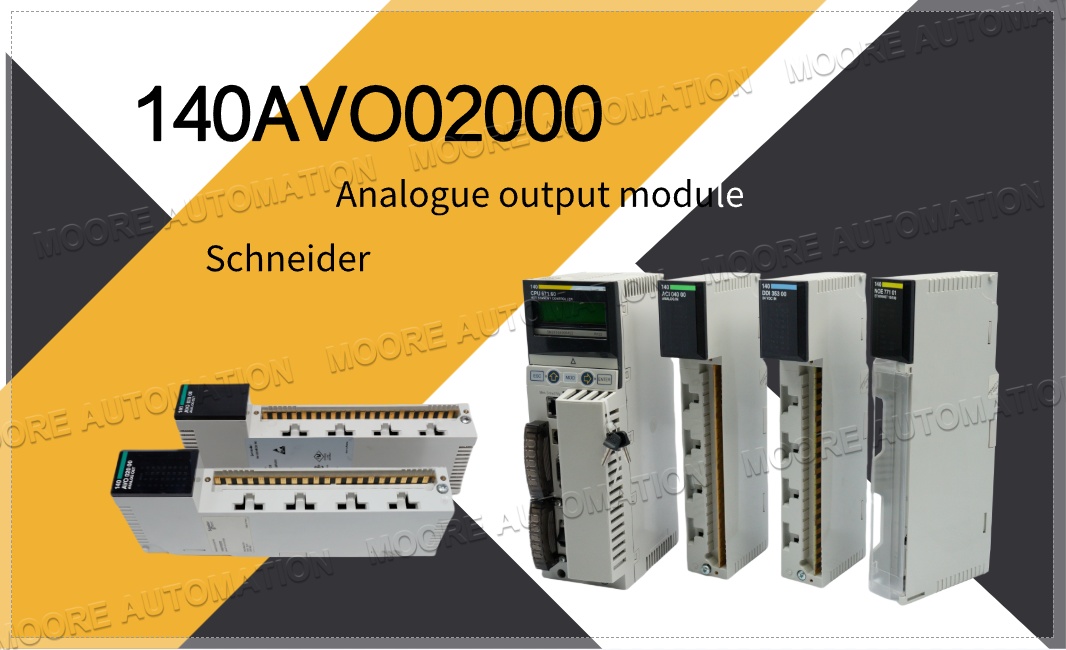
Product Overview The Schneider 140AVO02000 is a high-performance analog output module from the Modicon Quantum 140 series, specifically designed for industrial automation control systems. This module provides 4 analog outputs supporting -10mA to +10mA current signal output, making it suitable for process control, PLC system integration, and various industrial automation applications. Its 12-bit resolution and high-precision output make it an ideal choice for precision control. Key Features and Advantages High-Precision Output 12-bit resolution ensures fine control of signal output to meet high-precision industrial requirements. Absolute accuracy error of only ±0.15% (at 25°C) guarantees stable and reliable performance. Flexible Current Output Range Supports bidirectional current output from -10mA to +10mA, compatible with various industrial sensors and actuators. Long-Distance Signal Transmission Capability Maximum cable distance of 400 meters (1312.3 feet), suitable for distributed control systems. Low source resistance (0.1 ohm) minimizes signal attenuation, ensuring stability over long distances. Easy Integration and Configuration Adopts the standard architecture of the Modicon Quantum 140 series, compatible with existing PLC systems. 4 output word addressing simplifies programming and system configuration. Typical Application Scenarios The 140AVO02000 module is widely used in the following fields: Process Control: Such as flow, pressure, and temperature regulation in chemical, oil, and gas industries. Manufacturing Automation: For controlling servo motors, frequency converters, and proportional valves. Energy Management: Enables precise signal output in power generation and distribution systems. Water Treatment and HVAC Systems: Regulates critical parameters like pump speed and valve opening. Why Choose the 140AVO02000? Schneider Brand Assurance: Part of the Modicon Quantum series with proven industrial-grade reliability. Cost-Effective: Excels in long-distance transmission and multi-channel output requirements. Plug-and-Play: Seamlessly compatible with Quantum 140 PLC systems, reducing debugging time. Conclusion The Schneider 140AVO02000 analog output module, with its high precision, long-distance transmission capability, and ease of use, stands out as a preferred component in industrial automation. Whether for process industries or discrete manufacturing, this module delivers stable and precise control signal output, helping enterprises achieve efficient automated production.

Introduction to the Bently Nevada 149992-01 Relay Output Module The Bently Nevada 149992-01 is a high-performance, 16-channel relay output module designed for industrial automation and control systems. As a critical component in Bently Nevada's portfolio of condition monitoring and control solutions, this module ensures reliable operation in demanding environments such as oil and gas, power generation, and manufacturing. Whether you're managing complex machinery or safeguarding critical processes, the 149992-01 delivers the precision and durability needed to maintain operational efficiency and safety. Key Features of the 149992-01 Relay Output Module The Bently Nevada 149992-01 is packed with features that make it an ideal choice for industrial applications: 16-Channel Relay Outputs: Provides 16 independent relay channels for controlling multiple devices or systems simultaneously. High Reliability: Designed for long-term operation in harsh industrial environments, ensuring minimal downtime. Easy Integration: Seamlessly integrates with Bently Nevada's condition monitoring and control systems. Compact Design: Space-efficient form factor for easy installation in control panels and cabinets. Durable Construction: Built to withstand extreme temperatures, vibrations, and other challenging conditions. Safety Compliance: Meets industry standards for safety and performance, ensuring reliable operation in critical applications. Applications of the 149992-01 in Industrial Systems The Bently Nevada 149992-01 is a versatile module suitable for a wide range of industrial applications, including: Machinery Protection: Used in systems that monitor and protect critical machinery from faults and failures, ensuring uninterrupted operation. Process Control: Enables precise control of industrial processes, improving efficiency and reducing waste. Safety Systems: Integrates into safety shutdown systems to provide reliable operation in emergency situations. Power Generation: Supports the control and monitoring of turbines, generators, and other power generation equipment. Oil and Gas: Ensures safe and efficient operation of pumps, compressors, and other equipment in upstream and downstream processes. Why Choose the Bently Nevada 149992-01? The 149992-01 offers several advantages that make it a preferred choice for industrial automation: Reliability: Engineered for long-term performance in demanding environments, reducing the risk of unexpected failures. Scalability: Compatible with a wide range of Bently Nevada systems, allowing for easy expansion and integration. Ease of Use: Simple installation and configuration process, minimizing setup time and effort. Durability: Built to withstand harsh conditions, ensuring consistent performance over time. Proven Track Record: Backed by Bently Nevada's reputation for high-quality industrial solutions. Frequently Asked Questions (FAQs) 1. What is the primary function of the 149992-01 module? The 149992-01 is a 16-channel relay ou...
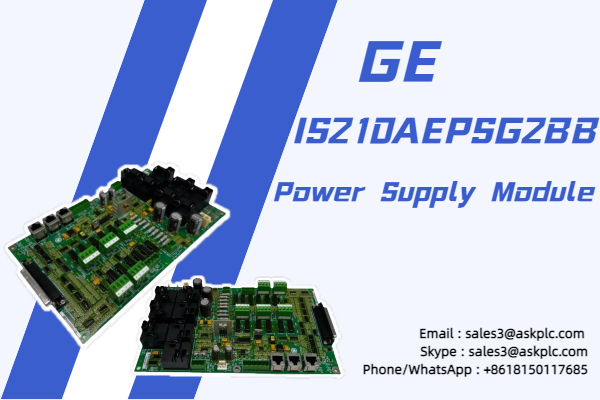
GE Unveils IS210AEPSG2BB Module to Boost Industrial Automation Efficiency -The new module will further optimize control system performance to meet modern industrial demands. In today’s rapidly evolving industrial automation landscape, GE (General Electric) has announced the launch of its latest product—the IS210AEPSG2BB module. This advanced module is the latest result of GE's ongoing innovation in automation control systems, designed to enhance the performance and reliability of industrial equipment while helping users achieve more efficient and precise production process control. Enhancing Automation Control Accuracy to Meet Modern Industrial Demands The IS210AEPSG2BB module incorporates cutting-edge digital technology and high-performance hardware, delivering superior control capabilities. It is specifically designed for industrial applications that demand high precision, responsiveness, and stability. Whether in energy, manufacturing, or other automation-intensive industries, the IS210AEPSG2BB can easily handle complex workloads while ensuring long-term, stable operation. Key Features and Advantages 1. High Reliability and Durability: The IS210AEPSG2BB module is built to withstand harsh industrial conditions, offering exceptional durability and resistance to interference. Even in extreme environments such as high temperatures and humidity, it maintains stable performance. 2. Superior Compatibility: This module is compatible with a wide range of GE’s control systems, allowing for seamless integration into existing automation facilities, reducing the complexity and cost of system upgrades. 3. Enhanced Fault Detection Capabilities: The IS210AEPSG2BB module features real-time fault detection and diagnostic functions, providing immediate feedback on system status, reducing downtime, and ensuring continuous production processes. 4. Ease of Installation and Maintenance: With its modular design, the IS210AEPSG2BB is quick to install and easy to maintain, saving time and effort for operators. Wide Application Prospects The GE IS210AEPSG2BB module is suitable for various industries, including but not limited to: 1. Energy Industry: Enhancing the automation level of power generation facilities, improving control system stability and responsiveness. 2. Manufacturing: Optimizing production processes, reducing equipment downtime, and improving productivity. 3. Chemical and Petrochemical Industry: Ensuring safe equipment operation in hazardous environments and enhancing fault prevention capabilities. Conclusion With the introduction of the IS210AEPSG2BB module, GE continues to strengthen its leadership position in the industrial automation sector. This module not only provides businesses with more efficient control solutions but also helps users achieve lower operational costs and higher productivity. As the demand for industrial automation grows, GE’s innovative technologies will undoubtedly play a crucial role in the ...
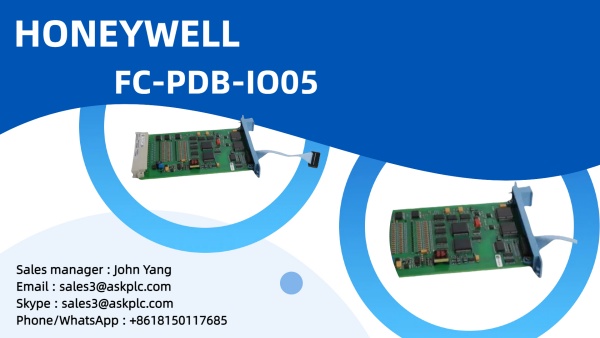
HONEYWELL Unveils FC-PDB-IO05: Advanced I/O Module for Automation – HONEYWELL has officially unveiled the FC-PDB-IO05, a state-of-the-art input/output (I/O) module designed to optimize industrial automation systems. This cutting-edge solution promises to streamline operations, improve connectivity, and enhance system efficiency across various industrial applications. – The FC-PDB-IO05 module is part of HONEYWELL’s continued commitment to delivering innovative and reliable solutions to industries worldwide. Engineered to support complex automation systems, the module offers seamless integration with control systems, enabling more efficient data communication and real-time process control. Key Features and Benefits: 1. Superior Connectivity: The FC-PDB-IO05 I/O module supports various communication protocols, including Modbus, Profibus, and other industry-standard interfaces, ensuring smooth and flexible integration into existing systems. This allows for better connectivity between field devices and control systems. 2. Improved Process Monitoring: With advanced features for monitoring input and output data, the FC-PDB-IO05 enhances system performance by providing accurate and real-time process information, critical for decision-making and process optimization. 3. Compact and Efficient Design: The module is designed to be compact yet powerful, making it suitable for various industrial environments where space is at a premium. Its efficient design helps reduce system complexity, ensuring easy integration and maintenance. Applications Across Industries: The FC-PDB-IO05 I/O module is ideal for use in a variety of industrial sectors, including: ⇒ Manufacturing: For seamless control and monitoring of production lines. ⇒ Oil and Gas: Enhancing system connectivity in remote and challenging environments. ⇒ Chemical Processing: Improving data communication between sensors and control systems for better process control. ⇒ Energy and Utilities: Streamlining process automation and ensuring efficient operation of power plants and utilities. A Step Toward Future-Proof Automation Solutions HONEYWELL’s FC-PDB-IO05 is a testament to the company’s dedication to advancing industrial automation and offering cutting-edge solutions for the modern factory floor. By delivering reliable, scalable, and high-performance I/O capabilities, this module is set to be a game-changer for industries looking to improve efficiency and productivity. Name:John Email:sales3@askplc.com Whatsapp:+8618150117685 Skype:sales3@askplc.com
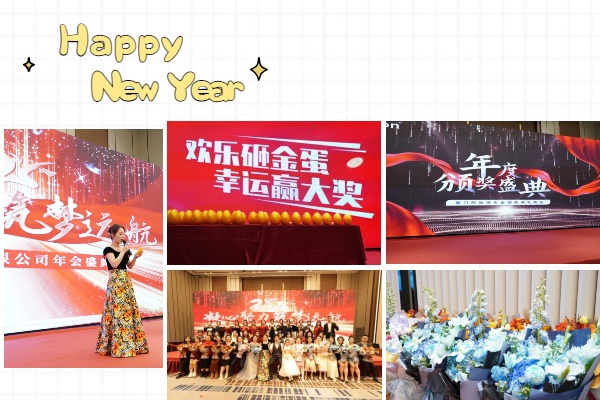
Annual Company Party Successfully Held, A Night of Exciting Moments • On January 20, 2025, the company hosted its annual party, where the atmosphere was vibrant and full of excitement. All employees gathered together to reflect on the achievements of the past year and look forward to the future development of the company. • The event officially kicked off with a speech by the company manager. In his speech, the manager expressed heartfelt gratitude to all employees for their hard work over the past year and presented the company’s vision for the future. He encouraged everyone to maintain their dynamic and ambitious attitude, to continuously strive for excellence, and to achieve even greater success in the upcoming year. • After the manager’s speech, the highly anticipated entertainment performances began. Employees had prepared various talents, including dances, songs, and comedy sketches, all of which showcased their versatility and positive spirit. Each performance received enthusiastic applause from the audience, and the atmosphere was filled with laughter and joy, reflecting the team’s strong unity and vitality. • In addition to the exciting performances, the event featured the “Smash the Golden Egg” game. Each employee participated, with the lucky winners receiving generous prizes from the golden eggs. The atmosphere was electric, filled with surprises and laughter. • The most exciting moment of the evening was undoubtedly the presentation of the year-end bonuses. Company leaders awarded year-end bonuses to outstanding employees, recognizing their hard work and dedication over the year. This recognition was not only an acknowledgment of their past efforts but also a motivation for their future endeavors. The smiles and applause of the awardees reflected the warmth and harmony of the company’s family-like atmosphere. • This year’s annual party not only offered employees a feast for the eyes and ears but also strengthened the team’s cohesion, motivating everyone to continue contributing to the company’s growth in the new year. While the event has come to a close, the enthusiasm and anticipation for the future continue, as the company and its employees eagerly await an even brighter tomorrow. Contact Infor Contact: John Yang Email: sales3@askplc.com 丨 Tel: +8618150117685 Whatsapp: +8618150117685 丨 Skype: sales3@askplc.com
Categories
New Products
Disclaimer:
Moore sells new and surplus products and develops channels for purchasing such products. This website has not been approved or recognized by any of the listed manufacturers or trademarks.
Moore is not an authorized distributor, dealer, or representative of the products displayed on this website. All product names, trademarks, brands, and logos used on this website are the property of their respective owners. The description, explanation, or sale of products with these names, trademarks, brands, and logos is for identification purposes only and is not intended to indicate any association with or authorization from any rights holder.
wechat code
